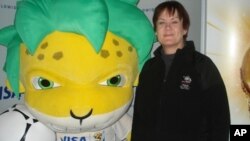At major sporting events around the world, there are restrictions on what fans can bring into the stadiums and arenas. That is no different at the FIFA World Cup in South Africa.
The FIFA World Cup Organizing Committee in South Africa has published a compact, colorful 88-page Fan Guide that is available to all visitors at no cost.
It includes a variety of information on the host country, such as the history of South Africa, banking, languages, weather and food. There is information on each of the nine host cities, with detailed maps of the stadiums and their immediate surroundings that point out things like security zones, ticketing centers and public transportation drop-off points.
Of course, there is a complete match schedule, though the print size on the center two pages is so small that for many it takes some magnification to read. World Cup fans without tickets can find the location of the Fan Fests in each of the host cities, where the games can be viewed in large groups on huge outdoor video screens.
There is also information on stadium conduct as well as what is prohibited inside the World Cup stadiums.
For instance, there are the obvious things like no weapons, no fireworks, no alcohol or drugs and no umbrellas. Nearly all kinds of noisemakers are banned, with the exception of the traditional South African vuvuzela plastic horns.
The one rule many fans are not happy with is the rule which does not allow them to bring food or water into the stadiums. But Chris, from New Zealand, said he can deal with it. "The security was fine. I expected that. We had no trouble getting in. And when it came to asking for food or drink or anything, then we were only allowed to buy inside, and only a drink without the cap on it. And I understand that. They've got to make sure people are safe. It was pretty easy going. In fact, I've been to an Olympics and I was more regulated in Beijing than I was at this World Cup," he said.
Another New Zealand fan here, Pam Sceats, has already been to four World Cup games and has tickets to attend two more. She said her group of 28 was informed about the rules before before traveling to South Africa. "We all got pamphlets which we were to read. Really large banners and poles we knew we weren't allowed to bring in. Anything that had a theme of racism, we were given a pamphlet on before we left New Zealand. What I didn't know was no food or drink (could be brought into the stadiums), but I understand it," she said.
Sceats said as she has passed through security, she has observed numerous confiscated items. "What was in the bins were bottles of water. There was food and large poles that were too big for the regulations for the banners because they had to be no bigger than a meter and a half or whatever," she said.
Pam Sceats said by far the most thrilling moment at this World Cup was when the New Zealanders' team scored in the dying moments of its opening group match to tie Slovakia, 1-1. It was New Zealand's first-ever World Cup point after losing all three matches in its only other appearance in the finals back in 1982. "It was almost like we won the World Cup, yeah, it actually was. And I understand it's just completely taken over New Zealand which is a rugby stronghold, so it's really great," she said.
There is one FIFA regulation that does not sit well with families. Parents who want to bring a small child or baby to a match have to purchase a ticket for themselves as well as their child, even if they plan to have the child sit on their lap throughout the match.
South African fan Duncan said he and other family members decided not to spend extra money on tickets for their small children. "You know, it's a bit unreasonable. It would have been nice to be able to take the small kids to the games for free and let them experience it," he said.
But Duncan added he and his family members who have gone to matches thus far have had a great experience, and they believe their country is doing a good job as host of the FIFA World Cup.
World Cup Fans Deal With Stadium Restrictions
- By Parke Brewer




